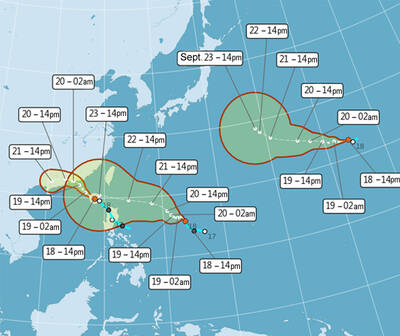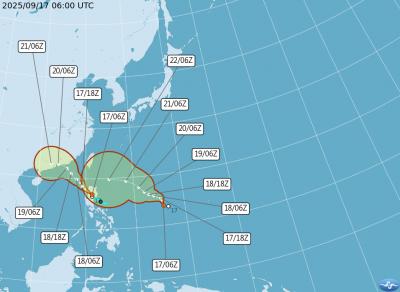Do not ignore symptoms of hypotension, a doctor warned on Saturday, following reports that former first lady Wu Shu-jen (吳淑珍) was hospitalized on Friday after collapsing at home allegedly due to low blood pressure.
Many people brush aside temporary loss of vision or dizziness when suddenly standing up, but postural hypotension could be a sing of autonomic nervous system dysfunction or could be linked to several health conditions, Taipei Veterans General Hospital’s Division of Genetics and Prenatal Diagnosis head Chang Chia-ming (張家銘) wrote on Facebook.
Studies have found that postural hypotension could be linked to diabetes, autoimmune disorders, menopause, post-COVID-19 conditions, vitamin deficiencies, chronic medicine intake, or trauma of the brain or spine, he wrote.

Photo: Pan Shao-tang, Taipei Times
People can prevent postural hypotension by drinking sufficient amounts of water (about 2.5 liters per day for most people); consume enough sodium (about 7g per day); stand up gradually and move their limbs in bed before sitting up; exercise regularly; and avoid trigger factors, such as dehydration, overheating, fatigue, low blood pressure and infections, Chang said.
If symptoms are not improved by adjusting daily habits, people should see a doctor, he said.
The diagnosis of autonomic nervous system dysfunction takes about two to three years of observation, down from about seven years previously, he said, adding that people should not be afraid of getting examined, as treatment would improve their quality of life.
Shin Kong Wu Ho-Su Memorial Hospital cardiologist Hung Hui-fong (洪惠風) said that postural hypotension can stem from a variety of factors, including medication, dehydration, impaired venous return, autonomic nervous system dysfunction and abnormal cardiac output, and it might take time to find the cause.
For example, a person had significantly fluctuating blood pressure, with their systolic pressure sometimes exceeding 200 millimeters of mercury (mmHg) and sometimes as low as 90mmHg, and it was measured at about 170mmHg to 180mmHg when they were lying down, but dropped to about 110mmHg to 120mmHg when they stood up, he said.
As people’s blood pressure sometimes drops after eating, those with postural hypotension should frequently measure their blood pressure at home to find their own patterns, so they can adjust daily habits and reduce the risk of fluctuating blood pressure, Hung said.
Writing in Taipei Veterans General Hospital’s monthly bulletin in July last year, the hospital’s chief of family medicines, Lin Sian-han (林賢翰), shared methods to reduce the risk of postural hypotension.
Postural hypotension is diagnosed by a drop of at least 20mmHg in systolic blood pressure or 10mmHg in diastolic blood pressure shortly after standing up from a lying or sitting position, he said, adding that symptoms might include dizziness, lightheadedness, blurred vision and fainting due to a sudden blood pressure drop.
Normally, the body can adjust blood flow when changing position to maintain a steady blood pressure, but in some circumstances the adaptation is inadequate and triggers postural hypotension, Lin said.
He suggested gradually changing position, such as sitting up from a lying posture and waiting for about three to five minutes to make sure they feel no discomfort before standing up, especially after waking up in the morning.
Adequate water intake can help maintain normal blood volume, especially in hot weather or after exercising, while wearing compression socks and doing ankle or leg exercises, such as ankle pumps or leg raises, can help improve blood circulation in the lower limbs, he said.
Avoid standing for too long, or lift one foot at a time to improve muscle contraction and blood circulation if standing for long periods of time cannot be avoided, he added.

NEW AGREEMENT: Malaysia approved imports last year after nearly two years of negotiations and inspections to meet quarantine requirements, officials said Up to 3.6 tonnes of pomeloes from Taiwan cleared Malaysian customs on Friday, in the first shipment of Taiwanese pomeloes to Malaysia. Taiwan-grown pomeloes are popular in domestic and overseas markets for their tender and juicy taste, the Ministry of Agriculture’s Animal and Plant Health Inspection Agency said. The fruit is already exported to Japan, Canada, Hong Kong, Singapore and the Philippines, it added. The agency began applying for access to the Malaysian market in 2023, compiling data on climate suitability, pests and diseases, and post-harvest handling, while also engaging in nearly two years of negotiations with Malaysian authorities and submitting supplementary

PEAK MONTHS: Data showed that on average 25 to 27 typhoons formed in the Pacific and South China seas annually, with about four forming per month in July and October One of three tropical depressions in the Pacific strengthened into a typhoon yesterday afternoon, while two others are expected to become typhoons by today, Central Weather Administration (CWA) forecaster Lee Ming-hsiang (李名翔) said yesterday. The outer circulation of Tropical Depression No. 20, now Typhoon Mitag, has brought light rain to Hualien, Taitung and areas in the south, Lee said, adding that as of 2pm yesterday, Mitag was moving west-northwest at 16kph, but is not expected to directly affect Taiwan. It was possible that Tropical Depression No. 21 would become a typhoon as soon as last night, he said. It was moving in a

A Taiwanese academic yesterday said that Chinese Ambassador to Denmark Wang Xuefeng (王雪峰) disrespected Denmark and Japan when he earlier this year allegedly asked Japan’s embassy to make Taiwan’s representatives leave an event in Copenhagen. The Danish-language Berlingske on Sunday reported the incident in an article with the headline “The emperor’s birthday ended in drama in Copenhagen: More conflict may be on the way between Denmark and China.” It said that on Feb. 26, the Japanese embassy in Denmark held an event for Japanese Emperor Naruhito’s birthday, with about 200 guests in attendance, including representatives from Taiwan. After addressing the Japanese hosts, Wang

One of two tropical depressions that formed offshore this morning could turn into a moderate typhoon by the weekend, the Central Weather Administration (CWA) said today. Tropical Depression No. 21 formed at 8am about 1,850km off the southeast coast, CWA forecaster Lee Meng-hsuan (李孟軒) said. It is expected to move in a northwesterly direction as it continues building momentum, possibly intensifying into Typhoon Mitag this weekend, she added. The radius of the storm is expected to reach almost 200km, she said. It is expected to approach southeast of Taiwan on Monday and pass through the Bashi Channel between Tuesday and Wednesday,